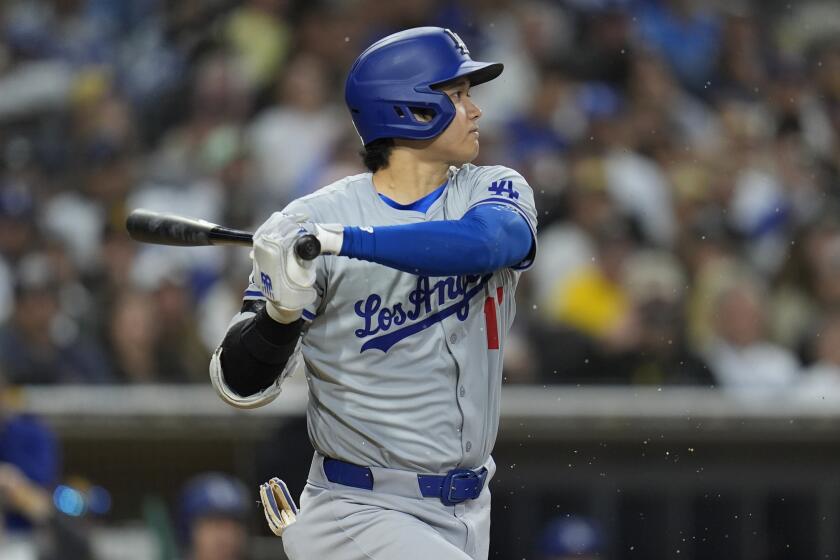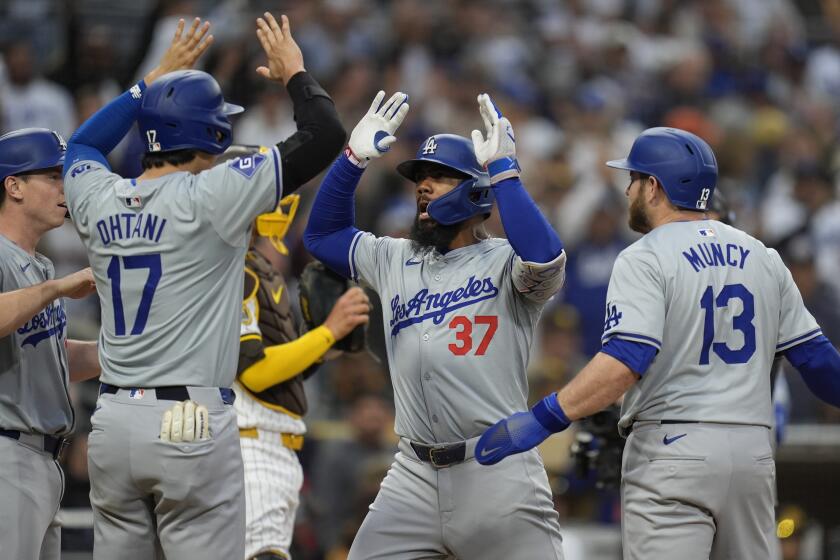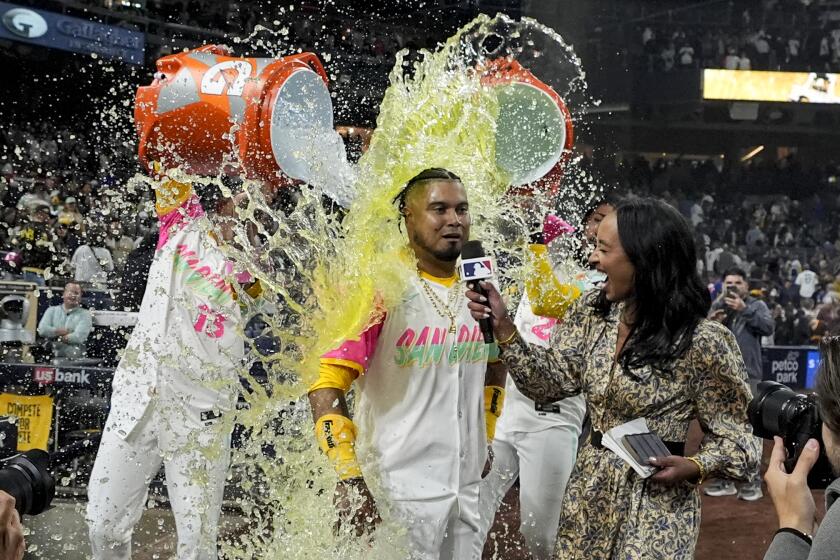Players Question Strategy : Baseball: Some say union demand for reduced arbitration eligibility isn’t worth delaying season.
Although Don Fehr continued to call salary arbitration the key issue of baseball’s labor dispute, several Dodgers joined a growing list of players Monday who apparently disagree with their union chief.
The players’ fight to have arbitration eligibility reduced from three years’ service to two is not worth delaying the start of the season, according to some Dodgers. They say they are not alone.
“If we could reach an agreement by leaving it at three years, I expect that’s what I would do,” said relief pitcher Tim Crews, who is working out with several major leaguers in the Orlando, Fla., area. “I’ve told this to Tim Belcher (the Dodgers’ interim player representative, who was en route to Phoenix), and I’ve talked to quite a few players who all say the same thing.
“We all agree that three years for arbitration is not a bad thing.”
Crews thinks Fehr will be apprised of that in today’s meeting with the Major League Players Assn.’s executive council in Phoenix.
“I think he will walk in that room and everybody will say that we should leave the arbitration at three years and this contract could be done in a couple of days,” Crews said.
Rick Dempsey said he thought that arbitration wasn’t even supposed to be a major issue in the negotiations, which has resulted in a spring training lockout that had reached 12 days Monday.
“I remember a couple of informal polls of the players, and arbitration was always the last consideration in line,” Dempsey said. “That’s why I can’t believe it is even a major issue here. Maybe that’s what some people are saying, but maybe something else is happening, like we’re fighting to get a 25th player, or fighting for pension benefits and licensing money.
“Hey, if arbitration is what is keeping us locked out, we can sacrifice that.”
Some Pittsburgh Pirates also said that arbitration eligibility was not worth a fight.
“We feel it’s going to be awful tough for the owners to give back that year, so if it’s the only thing holding this back, why not go ahead and agree?” pitcher Bob Kipper told the Pittsburgh Post-Gazette. “Who’s complaining? Probably the first- and second-year players. But I didn’t complain after two years.”
Added Pirate shortstop Jay Bell: “If that’s the only holdup, I don’t think it’s that big of a deal. We’ve gone four years with it at three years, and it’s worked out well.”
Said George Brett of the Kansas City Royals: “Personally, I feel three years is enough.”
However, Angel catcher Lance Parrish, one of nearly a dozen players from Southern California who are working out daily at El Dorado High in Placentia, said willingness to leave arbitration eligibility at three years is short-sighted and will cost all players in the end.
“Players who have said we should give in on arbitration should really have a good look at the situation. They’re speaking out of line,” Parrish said. “This is an important issue and something we’re going to hang on to. We gave up that year (of eligibility) in ’85 in order to get the negotiations going and now the owners are playing games and they weren’t willing to discuss it until the 12th hour.
“It hurts emotionally to not be in spring training, especially because I think this is all unnecessary. As intelligent as the owners are, they should realize the game is going well and just leave it at that.”
Fehr, who said he will meet with several other groups of players before returning to the negotiations in New York, said he was unaware of player disagreement.
“I have yet to have a player call and say we should be doing anything different,” Fehr said.
Said Charles O’Connor, negotiator for the owners: “I heard the quotes, but I didn’t hear the players say them directly. Now, if that’s what they all say in Phoenix, that’s different.”
One Dodger said such a change is possible. Pat Perry, vocal in his support of the two-year arbitration plan because of how the system affected former St. Louis Cardinal teammates, nonetheless said it could disappear as a main issue.
“I think arbitration is definitely worth the fight--I’ve seen how owners used the current system to keep guys like Vince Coleman and Joe Magrane in the minor leagues a little longer to cost them a year’s service and save the club money,” Perry said.
“But if it is presented to us as a main issue, we may take a new position. If it will put the season in jeopardy, we’ll have to step back and take a look.”
San Diego Padre pitcher Greg Harris would be ineligible for arbitration until after the 1991 season under the current basic agreement. But if arbitration eligibility is reduced, Harris stands to earn considerably more than the average salary of $219,114 for players who have between two and three years of service time.
“I know this affects my life and livelihood, and I’d be lying if I said this wouldn’t really benefit me, but I’m really not that concerned with that right now,” said Harris, who earned $71,500 last season and is expected to earn less than $200,000 in 1990.
“Maybe that’s not very smart on my part, but I don’t see dollar signs that much. It’s not something I’m really thinking about. If you do the job on the field, one year isn’t going to hurt that much.”
Tony Gwynn disagreed. “Hey, I’m just like everyone else, I want to get to spring training and play,” Gwynn said. “In fact, I’ve already got my bags packed. But I’m not ready not ready to play at the expense of what happened last time.
“There were a lot of guys who were screwed because of what happened then. It’s not going to be like ’85 when guys say, ‘Hey, I got my seven years in, I don’t care.’
“We can’t have anybody suffering again. The owners were crying poor, and we fell for it.”
Some Dodgers, however, believe the current plan is actually more rewarding than the old one.
“It’s a case of, you put in your dues and you will be fine,” Jeff Hamilton said. “A lot of us have had to go that way.”
Said Crews: “With three years, you have a lot more statistics you can take to arbitration with you. It’s easier to prove your case. And for your first three years, it makes you work harder.”
All Dodgers interviewed agreed, however, that they wanted to make sure everything else in the contract was acceptable before giving up the arbitration demand.
“If everything else has been resolved, that makes a difference,” pitcher Jay Howell said. “But is everything else resolved? I don’t think we know that. I’m not so sure that arbitration is the only thing left. Maybe it is the most newsworthy item, the most understandable item. But is it the only one?
“I guess the players still have a lot to find out.”
Times staff writers Helene Elliott and Bob Nightengale contributed to this story.
More to Read
Are you a true-blue fan?
Get our Dodgers Dugout newsletter for insights, news and much more.
You may occasionally receive promotional content from the Los Angeles Times.







